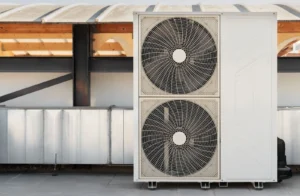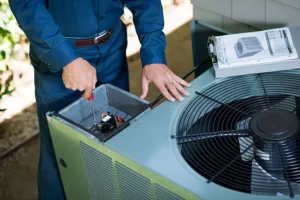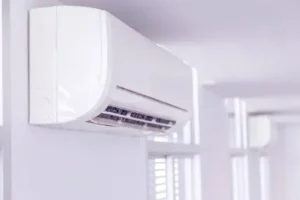Deciphering Refrigerator Error Codes: Understanding Alerts for Timely Appliance Repair
Understanding refrigerator error codes is crucial for homeowners to identify and address potential issues before they escalate into major problems.
Refrigerators are indispensable appliances in modern households, tirelessly keeping our perishables fresh and our drinks cold. However, like any complex machine, they can encounter issues requiring prompt attention. One way refrigerators communicate their problems is through error codes displayed on their control panels. In this comprehensive guide, we’ll delve into common refrigerator error codes, helping homeowners understand when their appliance requires professional attention for timely and effective appliance repair.
Table of Contents
- Interpreting Error Codes and Their Implications
- Error Code 1: Temperature Sensor Malfunction
- Error Code 2: Defrost System Failure
- Error Code 3: Condenser Fan Issue
- Error Code 4: Ice Maker Problems
- Error Code 5: Door Seal or Gasket Compromise
- Error Code 6: Refrigerant Leak Detection
- Taking Action: Steps to Address Refrigerator Error Codes
- Refer to the Owner’s Manual
- Perform Basic Checks
- Reset the Appliance
- Contact Professional Repair Services
- Conclusion
Interpreting Error Codes and Their Implications
Error Code 1: Temperature Sensor Malfunction
A temperature sensor malfunction is a common issue that can disrupt the refrigerator’s ability to maintain optimal temperature levels. This error code indicates that the sensor responsible for monitoring the internal temperature of the refrigerator has detected an abnormal reading. As a result, the appliance may struggle to maintain consistent temperatures, leading to potential food spoilage.
Error Code 2: Defrost System Failure
When the defrost system fails, it can result in excessive ice buildup on the evaporator coils. This buildup obstructs airflow and prevents the refrigerator from effectively cooling its interior. In addition to causing temperature fluctuations, a defrost system failure can also lead to water leakage and potential damage to the appliance’s components.
Error Code 3: Condenser Fan Issue
The condenser fan plays a crucial role in dissipating heat from the refrigerator’s condenser coils. If the fan fails to operate properly, heat may accumulate around the coils, causing the refrigerator to overheat. In addition to compromising the appliance’s cooling efficiency, a condenser fan issue can also lead to compressor failure if left unaddressed.
Error Code 4: Ice Maker Problems
Error codes related to the ice maker typically indicate issues with water supply, ice production, or dispenser functionality. Common problems include clogged water lines, malfunctioning valves, and defective ice maker components. Addressing these issues promptly is essential to ensure uninterrupted ice production and prevent damage to the appliance.
Error Code 5: Door Seal or Gasket Compromise
A compromised door seal or gasket can allow warm air to infiltrate the refrigerator, leading to temperature fluctuations and increased energy consumption. Over time, wear and tear or damage to the door seal can compromise its effectiveness, resulting in air leaks. To maintain optimal cooling efficiency and prolong the lifespan of the appliance, it’s essential to address any issues with the door seal promptly.
Error Code 6: Refrigerant Leak Detection
A refrigerant leak is a serious issue that can impair the refrigerator’s cooling ability and pose health and environmental risks. If the appliance detects a refrigerant leak, it will display an error code to alert the user to the problem. Refrigerant leaks can occur due to damage to the refrigerant lines, compressor issues, or manufacturing defects. It’s crucial to address a refrigerant leak promptly to prevent further damage to the appliance and ensure safe operation.
Taking Action: Steps to Address Refrigerator Error Codes
Refer to the Owner’s Manual: The owner’s manual often contains troubleshooting tips and error code explanations specific to your refrigerator model. Consult the manual to gain insights into the meaning of error codes and recommended actions.
Perform Basic Checks: Conduct visual inspections of the refrigerator’s components, such as the condenser coils, fan blades, and door seals, to identify any visible signs of damage or obstruction. Clearing obstructions and cleaning components can sometimes resolve minor issues.
Reset the Appliance: Some error codes may be temporary and can be cleared by resetting the refrigerator. Refer to the owner’s manual for instructions on how to perform a reset, and observe if the error code reappears after resetting the appliance.
Contact Professional Repair Services: If error codes persist despite troubleshooting efforts, it’s advisable to seek reliable appliance repair services. Certified technicians have the expertise and tools to diagnose and repair complex refrigerator issues safely and effectively. They can also provide preventive maintenance to ensure the refrigerator operates efficiently.
Certified technicians are trained to handle various refrigerator models and are familiar with the intricacies of modern appliance technology. Whether it’s a malfunctioning temperature sensor, a defrost system failure, or a refrigerant leak, these professionals have the knowledge and experience to address the issue safely and effectively.
Moreover, professional repair services offer preventive maintenance programs to keep your refrigerator in top condition. Regular maintenance checks and tune-ups can help identify potential issues before they escalate into major problems, saving you time and money in the long run. By partnering with experienced technicians, you can extend the lifespan of your refrigerator and ensure its continued reliable performance.
When selecting a repair service, opt for a reputable and affordable appliance repair service with a track record of excellence in the industry. Look for certifications or manufacturers’ training programs to ensure you’re working with qualified professionals. Additionally, read reviews and testimonials from previous customers to gauge the quality of service provided.
By entrusting your refrigerator repair needs to appliance repair technicians, you can enjoy peace of mind knowing that your appliance is in capable hands. Don’t hesitate to reach out to amazing appliance repair services to address persistent error codes and restore your refrigerator to its full functionality.
Conclusion
By deciphering these codes and taking prompt action when necessary, individuals can ensure their refrigerator continues to operate efficiently, preserving food freshness and minimizing the risk of costly repairs. Stay proactive in refrigerator maintenance, and keep your appliance running smoothly for years to come.
Ready to address refrigerator error codes and ensure optimal appliance performance? Contact us today for expert repair services and maintenance solutions tailored to your needs. Don’t wait until it’s too late. Take action now to keep your refrigerator running smoothly.







